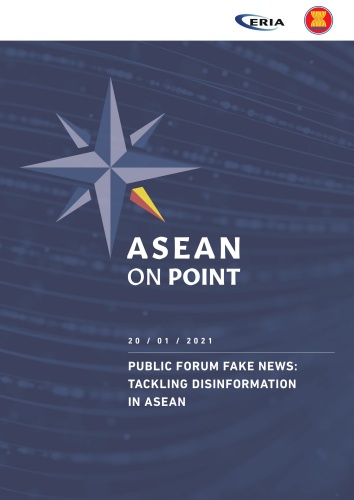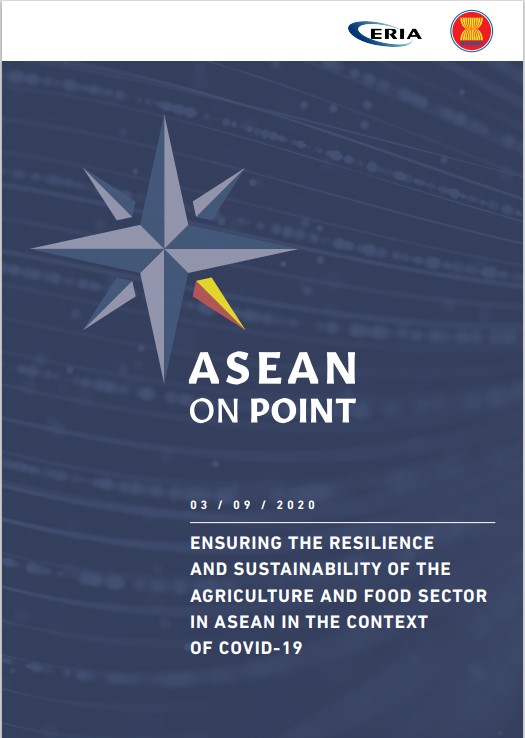ASEAN on Point Public Forum: How Policies can Support the Private Sector in Combatting Marine Plastic Debris

Print Article:
As a result of rapid economic growth coupled with the lack of solid waste management infrastructure, East and Southeast Asian regions are recognized today as the biggest contributors of marine plastic pollution. Plastic is a material that is versatile, resistant, lightweight, and inexpensive to produce, which makes it ubiquitous in our everyday lives. However, the amount of plastic waste released in our environment and its negative effects on our marine ecosystem have attracted increasing scientific concern in recent years. In 2019, alarmed by this situation, the ASEAN Member States welcomed the ASEAN Framework of Action on Marine Debris and adopted the Bangkok Declaration on Combating Marine Debris in ASEAN Region. Although much is still left to be studied, particularly the long-term impacts of plastics on our marine ecosystem, and its potential harm to human health through the food chain, there is a wide international consensus to take urgent preventative actions before further damage is done. Echoing these concerns, ERIA has established the Regional Knowledge Centre for Marine Plastic Debris (RKC-MPD) in 2019 to provide the ASEAN+3 Member States with support in addressing emerging challenges associated with marine plastic debris.
Given the multitude of roles plastic plays in our society, responses to marine plastic pollution will need to involve a wide array of stakeholders, from governmental and non-governmental organizations, research institutions, international actors, the business sector, to the general public. The need to collectively investigate integrated solutions that move away from a linear take-make-dispose economy, into a more circular and sustainable one has never been greater.
At the event, ERIA and ASEC focused on the important role played by the private sector, especially in tackling plastic waste from upstream production. Indeed, some of the leading private companies in the ASEAN+3 region have paved the way for the development of products, technologies, and services that reduce plastic waste generation significantly and by consequence, preventing those plastics from leaking into the marine environment. One of the important missions of ERIA and ASEC is to acknowledge efforts undertaken by businesses and to shine a light on their accomplishments in the hope of further promoting this positive shift. It will be an occasion for the participants not only to learn about innovative business practices conducive to plastic waste mitigation, but also to provide policy recommendations that will be shared with policymakers across the region.
In this forum, ERIA presented about the Regional Knowledge Centre for Marine Plastic Debris (RKC-MPD) and its activities which was established under ERIA in October 2019 in order to address marine plastic pollution in ASEAN+3 Member States. The goals of the RKC-MPD are to (a) create a regional network and raise awareness regarding MPD, (b) promote innovative actions in each member country, and (c) facilitate national and regional cooperation. Capacity development and information sharing are the two chief pillars that underpin the RKC-MPD’s work. Partnering with the private sector to promote good practices implemented is one of the important ongoing activities. On this front, an online platform to support private sector initiatives to reduce plastic waste and marine plastic debris was launched in 2021 (https://rkcmpd-eria.org/story). The platform collects and disseminates private companies’ business activities that are conducive to marine plastics mitigation. Inspired by the private companies’ representatives invited at this occasion, it is hoped that the forum would attract a larger number of private companies to take part in this initiative and join forces in the fight against marine plastics.
Over 200 participants joined the conversation with a panel of experts:
- Supatchaya Techachoochert, Co-Founder, Refill Station, Thailand
- Tommy Tjiptadjaja, Co-Founder and CEO, Greenhope, Indonesia
- Kentaro Inukai, President, Pana Chemical, Japan
- Iris Chang, Director of Social Impact and Sustainability, Grab, Singapore
Moderated by:
- Dwight Jason Ronan, Senior Officer, The ASEAN Secretariat
- Michikazu Kojima, Research Fellow, ERIA
Download Report
ASEAN on Point Report - How Policies Can Support the Private Sector in Combatting Marine Plastic Debris by Economic Research Institute for ASEAN and East Asia on Scribd




